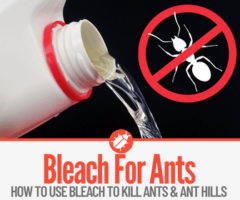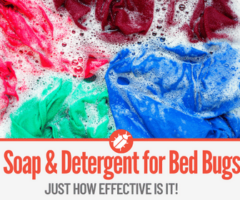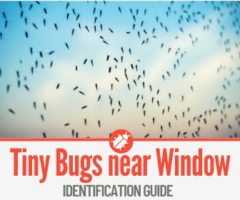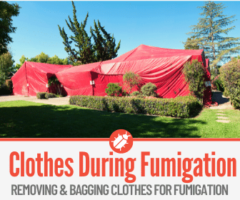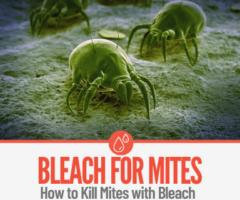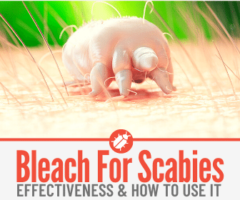Bugs are one of the worst things you can have inside your home. Not only do they wreak havoc on your home but they can cause serious illness in a home’s inhabitants, whether it be you, your children, or your pets.
While you can buy some insecticides to rid your home of pests, they are often filled with man-made chemicals often unsafe for pets and children to be in immediate contact with.
Ammonia on the other hand is a naturally occurring pesticide alternative you can use on your home.
Ammonia is a naturally occurring pesticide and feeding attractant for insects. It’s even found in humans and the natural environment during the decomposition of proteins in food.
When in high concentrations, Ammonia is a compound of Nitrogen and Hydrogen used in agriculture as a fertilizer, purifier, and cleaning solution.
That being said, the highest percentage of Ammonia allowed in solutions made for the public is 25%, as anything more is found to be incredibly corrosive on any given surface. Most cleaners and fertilizers hold anywhere from 5-10% concentrated Ammonia.
How Can Ammonia Kill Bugs & Pests
Ammonia acts as a feeding attractant to most insects as it is a naturally occurring decomposition by-product, found to be especially alluring to bottom feeders and pests. Ammonia produces a pungent, sharp odor and is used as a guide to where the food or decomposed matter is located.
When Ammonia is mixed with nay variant of citrus, the ammonia mixture acts as an insect repellent. Ammonia is a very corrosive substance, making it harmful to most living things it comes into direct contact with.
Ammonia is effective for getting rid of most insects due to the corrosive element that Ammonia and its main component – Ammonium BiCarbonate carries.
Bugs & Pests Affected by Ammonia
There are multiple insects affected by the use of ammonia in your home. Below we have listed some of the most common home pests as well as popular ways to use ammonia in hopes of clearing your home of these pests.
Ants
Ants are perhaps the most common pest to encounter in your household. While there are many ways to naturally prevent and eliminate them from your home, ammonia seems to be a common option among homeowners.
Ammonia can be used as a repellent however, the results from using Ammonia are only temporary. The pungent aroma of Ammonia is enough to cause the ants in your home to scatter and find other places to reside, however once the smell of ammonia is cleared from the old area you can expect to see them come back to their nests with a vengeance.
Ammonia can only kill a limited amount of ants if in direct contact. Often times homeowners will drench ants in an ammonia solution in hopes of killing them. A popular solution you can use for ant prevention methods includes combining bleach, ammonia, and hot water into a spray bottle and spraying any cracks and crevices/popular places in your home where you’ve noticed ants.
While drenching ants in solutions do work to some degree, you’re only killing the worker ants that are making themselves known in your home. For effective elimination, you’ll need to ensure that the ants are feeding their nest with it as well as themselves.
For Ammonia to properly rid your home of them, you’ll need to combine it with poisoned bait. When consumed, the worker ants will take the poison they ingested back to their farm and regurgitate the ‘food’ to their Queen. Effectively killing a majority of the farm.
One of the best bait solutions you can make to rid your home of these pests include buying a poison called Amdro. Amdro is specifically designed to attract and kill ants, when combined with Ammonia the bait will be impossible to survive.
Fleas
Fleas are probably one of the worst pests to have to deal with, as they are very resilient and hard to successfully get rid of. If you have pets, you’re bound to have a run-in with these pests eventually.
When using Ammonia, you’ll have to ensure a consistent schedule with it’s application. If you’re not consistent, it will take longer for you to get rid of them.
Winter is prime time to prevent their existence in your home, as fleas hibernate in cold temperatures. They will temporarily freeze themselves and come back from Spring to Summer.
Unlike Ants, Fleas are a great target when using Ammonia for annihilation. Ammonia is extremly toxic to these little blood suckers, and when properly used can keep them away from your home and pets for good.
That being said if you do plan on using Ammonia for a flea problem you should evacuate your children and pets for 4+ hours. Ammonia is very corrosive and can cause exponential damage to not only you and your home but your children and pets as well.
You can make equal parts of ammonia and water into a spray bottle and spray your pets bedding, entryways, and carpets. Floors can be mopped with an ammonia solution as well but be sure to wear protective layers.
Once the ammonia solution is applied you should wait a minimum of 4 hours before vacuuming and deep cleaning to properly rid your home of fleas. This step is imperative.
If you’re area isn’t deep cleaned after application there is a chance that the surviving fleas will reproduce and cause a larger infestation that will be harder to rid yourself of.
Once your area is clean it’s imperative to bathe your pet in antibacterial flea ridding soap before returning them to your residence.
Roaches
Roaches are a super irritating and gross pest to deal with however, Ammonia is a great way to permanently rid yourself of their presence.
Unlike fleas and ants, direct contact with Ammonia will kill a roach instantly. Ammonia is insanely corrosive, and while most insects are super resilient to this chemical, roaches will dissolve when placed in direct contact.
Ammonia will dissolve a roach from its outer layers and tissues. Ammonia isn’t survivable for these critters as it will quickly cause self-corrosion.
Both pure Ammonia as well as household Ammonia are proven to be extremely effective. The pungent smell will also work as a repellent.
If you know you have a roach problem, you can anticipate their copulation to be something of an extermination nightmare. For this instance, you’ll need to search your home to find common hiding places where they’ll run to for ‘safety’.
Often times you’ll find cabinets, sinks, drains, and under refrigerators and furniture is where they’ll hide and reside. When you find these places you’ll need to look for eggs and signs of an infestation.
To kill roach eggs, you’ll need to either soak them in ammonia or smash them and then spray an ammonia solution directly on and around the area to ensure that you’ve killed all the unhatched larva.
The reason being, is that roach eggs are coated in a watery/slippery substance. Thus making it harder for ammonia to work on the eggs as it will slide right off protecting the hatchlings. If you’re going to use an ammonia solution against the eggs you’ll need to completely drown the egg in the solution for it to work and kill of the eggs.
Common solutions for roaches include:
– 4 cups of ammonia with 8 liters of hot water down drains
– 2 parts of ammonia and 1 part of hot water will kill roaches instantly on contact
– 2 cups ammonia and 1 gallon of water water to mop under furniture and on entryways
Spiders
Ammonia when used on spiders is very toxic and will operate as a repellant and elimination method. Ammonia is toxic to spiders due to its corrosive properties.
When placed in direct contact with pure ammonia, spiders will die minutes after coming into contact with it much like roaches, it eats away their protective layer and continues to eat away at their bodies.
Springtails
Springtails are found in cellars, bathrooms, damp walls, and window moldings of homes. Oftentimes, springtails are found in more rural areas and homes.
For Ammonia to properly dispel these bugs from your home it will need to be concentrated. Diluted Ammonia will not repel nor eliminate them from your home.
Springtails are insanely resilient, and hard to get rid of, however, homeowners have been known to use vinegar and bleach to get rid of them.
Flies/Fruit Flies
Flies are one of the most common home pests, so it is natural to want to get rid of them and keep them from continuously coming into your home.
Ammonia will successfully annihilate and prevent them from coming back into your home. Ammonia can be used as a spray or as a drain cleaner.
Ammonia being poured down the drain is known to be the most effective method, however, be sure to dilute it prior as Ammonia can be very harmful to your drainage system.
Wasps
Ammonia on wasps is a popular method, however, it requires you to be able to get close to their hive. Common wasps killed by ammonia are ground wasps as it’s easier to infiltrate their hive.
Ammonia is also used to not only kill wasps around your home but to also treat wasp stings, as it eats away at the proteins found in wasps poison.
For Ammonia to properly work, make sure to track all of the hives around your home to ensure that you don’t miss one. When you’ve found all of them be sure to pour ammonia into the hive and cover the entrypoint with an oversized rock. Enclosing wasps in with the poison.
Most homeowners, if they don’t want to buy ammonia, they will purchase windex and use it the same way. Windex carries a chemical similar to ammonia that will do the same thing as ammonia.
Bees
Ironically while ammonia will kill wasps, when concentrated, ammonia will not kill bees. For ammonia to properly work on bees you will need to mix it with windex or bleach.
That being said, vinegar and bleach is extremely effective in killing bees and keeping them from your humble abode.
Gnats
Gnats, a lot like flies are affected the same way when it comes to using ammonia to rid your home of them. Ammonia releases a gas that damages larva and kills adult gnats.
Ammonia suffocates gnats. You can pour it down the drain just like with flies, however you’ll need to dilute it with warm or hot water prior as it will damage your drain and the pipes due to its corrosive property.
Mice
Ammonia with mice acts as a repellent however it doesn’t impact their behavior nor will it kill them right away. Ammonia carries a strong and pungent smell. The smell is enough to scare the mice away however on its own, ammonia isn’t enough to cause death to these rodents.
Ammonia is good for cleaning and disinfecting mouse droppings. To use ammonia as a mouse repellent it’s imperative to find their hiding spot in your home as well as how they enter your home.
Once you find where they reside, find a container for the ammonia, as well as a lid. Poke holes in the container and pour in a diluted version of ammonia so as to not dissolve the container.
Putting it in the spot they hide and reside, will run them away. cleaning your home and entry ways with ammonia will completely run thm from your residence.
Lice
Ammonia is found in common hair dyes and bleach, however it is not the most conducive way to rid yourself of lice. The ammonia in the solution will kill lice but not their eggs.
It’s better to use at-home lice treatment, as ammonia is an alkaline substance that creates an inflaming gas. Subsequently, this gas can kill any living lice on your head however, that doesn’t include their eggs or the lice found in your sheets or pillowcases.
Safety Tips for Using Ammonia To Kill Bugs
Most mixtures you will come across are diluted with water to minimize the corrosive side effects Ammonia can have on surfaces or when in direct contact with skin.
As mentioned through most of this article, ammonia is extremely corrosive and can cause a number of health problems. It’s imperative you follow the following safety tips.
– Gloves/Goggles: If your skin or eyes are in contact with ammonia, you will receive corrosive injuries. These injuries can include chemical burns, blindness, and severe eye damage.
– Good ventilation: Should you breathe in ammonia, you put yourself at risk to have bronchial edema, respiratory failure, and burning of your nose, throat, and respiratory tract.
– Removal of children and pets for a minimum of 4 hours: It’s imperative to not come into contact with ammonia if you don’t have to. This prevention method will put only the applicator at risk for the aforementioned health risks.
Ammonia Vs. Insecticide
While ammonia is a naturally occurring pesticide, there are insecticides that will do the same job as ammonia with fewer health risks. Ammonia is a colorless gas with a sharp, and intimidating odor, often diluted with water.
In comparison to Insecticides, ammonia poses a greater threat and danger to pets and children. While ammonia is only really found as a liquid or gas, insecticides range from dust to gels and bait.
Insecticides are mostly manufactured chemicals, however, there are a few natural ones that pose less danger than ammonia.
Is It Worth It to kill bugs & Pests with Ammonia?
Ammonia is a naturally occurring chemical that is used as a pesticide and cleaning product. However, the danger that this chemical poses to homeowners, occupants, and pets make it a little hard to justify using it as a pesticide for your everyday pests.

